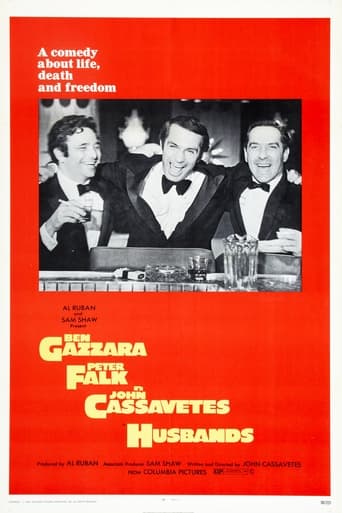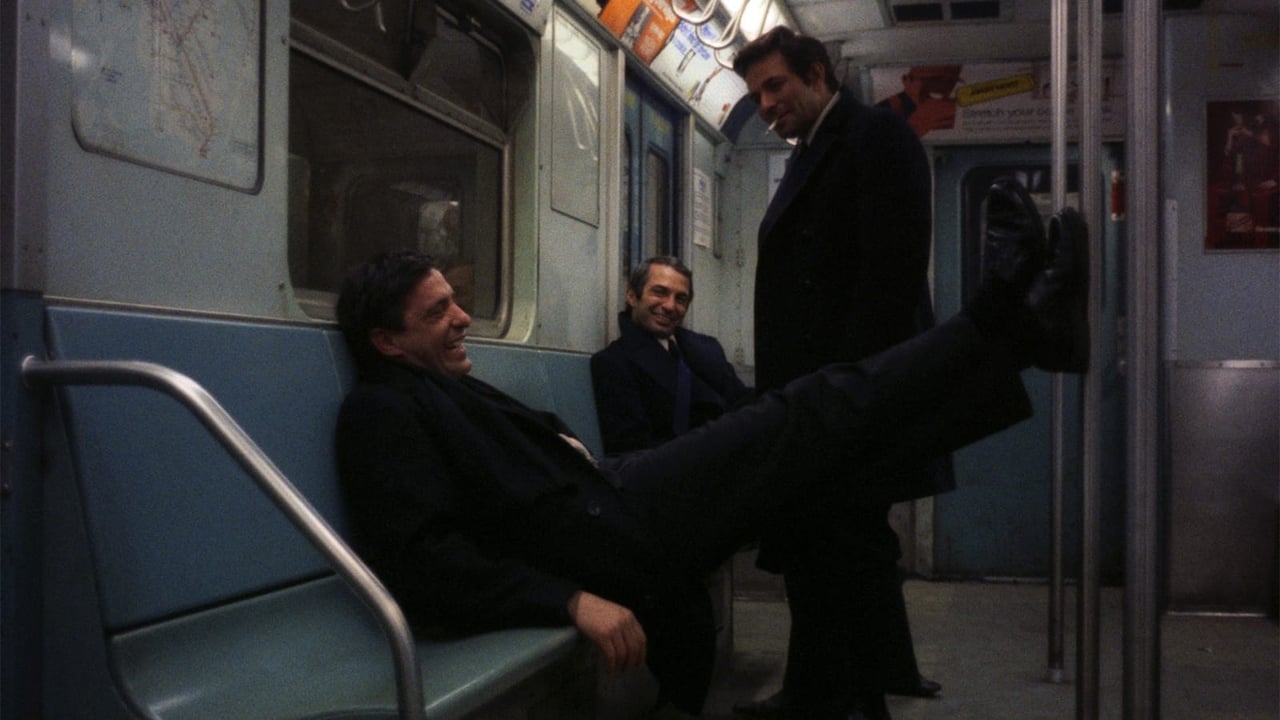evening1
Three buddies going way back adjust to the sudden death, by heart attack, of a fourth, and it ain't pretty. "People die of tensions -- that's all they die of," opines the earthy character played by Peter Falk, and we wish to hear more of his speaking from the heart. However, members of this macho, posturing triumverate hardly mention their departed friend at all. Instead, we observe all manner of acting out, from drinking too much, yelling at each other and at women, acting impulsively, throwing money around, and being unpredictable. "At 27, men realize they are not going to be a professional athlete," one of the buddies says along the way. "You reach 30 and realize it's over." Er, OK. For the rest of the movie, we watch these boy-men try to forget that time stops for no tide. Many of the principals and tangential characters giggle uncontrollably -- not that anything is very funny here -- and one wonders if usually creative director John Cassavetes, famous for his cinema-verite style of filmmaking, is stalling for time, trying to figure out what should come next. The three main characters, played by Cassavetes, Ben Gazzara, and Falk, look a lot alike, especially at the beginning, and it's hard for a while to keep the characters straight. One thing is clear, though, and that is that the men are lost, lost, lost. On the outside they look like professionally successful family men. At a closer glance, we see that they are deeply alienated, and completely incapable of having an authentic interaction with another human being. The unseen tragedy of their friend's passing causes them to question everything -- to the point of going to bed with none-too-appealing strangers in London -- and when the shock subsides, things go back almost to the way they were before. A pretty sorry picture of American domesticity.
Indy-11
This would be the ultimate Donald Trump film. Complete utter sexual, misogynistic, revolting garbage. Though Gazzara, Falk, and Cassevetes have been in many great films and have great screen credits to their names, this is a tremendous black mark on all of their output. It's entirely clear that a real script and decent editor possibly would have helped this film. Watching a 30+ minute drunken bar scene that did not either advance the plot or story only severed to make me feel bad for the one female trying to do her best.Peter Falk line: "I'm an American, I'm from New York." Come on.It's very clear that the actors were asked to improvise way to much and that they're not very good at it. At least by 2016 standards. Blecck.
Kieran Wright
The chances are that, if or whenever you hear the name 'Peter Falk', you instantly associate it with the excellent award winning TV detective series, 'Columbo'. If you stretch your mind a bit, you may even recall that he appeared in a couple of films such as 'The Great Race' or 'It's a Mad, Mad, Mad, Mad World'. If that's the extent of your knowledge of this actor, then you are missing out on a number of excellent performances, one of which appears in this film. Essentially 'Husbands' covers the unravelling self-confidence of three close friends, who suffer the loss of their close fourth friend, and the plot effectively deals with the subsequent fallout. It is, by turns, humorous, black and difficult to watch at times, but for me, it was a brave attempt to capture this subject on film. John Cassavetes, who not only stars in the film but also directs, was known as a pioneer of American cinema - particularly for using the POV genre - and with films such as this, it's easy to see why. In terms of the main three actors, each brings a depth, but not only that, a true tragi-comedic element, to their characters, which are highly believable. It would be difficult to single one of the main three actors out for particular praise, such is the balance and interplay. Highly recommended, not only for men of a certain age but also for women seeking insight on the mind of men.
desperateliving
There is something cathartic in Cassavetes' films, in how he gives his audience tough love, a kind of love that scrapes off any inessential, false emotion. He loves us enough to show us new things -- he gives us gifts he wants us to use. He is just as much interested in OUR emotional truth as that of his characters, a physical filmmaker who wants us to experience his film bodily, so scenes go on for lengths unseen in a Hollywood film.It's a common thing to label Cassavetes' films as cinema verite, and while that makes sense in terms of the feeling of spontaneity, Cassavetes' composition is sometimes unparalleled; it is very intelligently used and deserves to be examined. The camera has a vitality of its own -- it is not used as a character, but it is absolutely essential as film (unlike the claims that Cassavetes is uncinematic), weaving in and out, capturing images that gain a new significance, yet are never highlighted or indicated. There is one image of such beauty in the film that it's stayed with me for weeks: after Gazzara tells Cassavetes that he loves him and Falk more than his wife, we see Gazzara's face from the side, just slightly out of focus. Like Bergman, Cassavetes is a poet of the human face. Like Dreyer, his film, and his characters, are utterly sincere. That sincerity can be off-putting to people who prefer a barrier between them and their art, who need a distance. Cassavetes doesn't believe in that. Watching the film, I was overcome with this feeling, not from the intense emotions of the characters (though that is important) but from the presence of the film itself. You watch it and you realize the truth and the greatness of it, stripped bare of any trickery, any cinematic evil: mockery, stereotypes, clichés, "answers." To call Cassavetes a truthful artist is itself a cliché, but watching this, you're in the presence of genius. Not in the way we normally think of genius, and that's its earth-shattering effect: this is the closest thing to soul on film. It's far too easy and too glib to view this as sledgehammer acting -- there are such subtleties and profound realizations of emotional truth that you will have a hard time watching Dustin Hoffman or men of his ilk after seeing this. (Nick's acting is a sore spot -- showing off for pop.) Very few actors have more to give than these three men. Nothing in the movie is expected. Every cliché is turned on its head, but it's not merely the opposite of expectation: it's something new. (Where else have you seen a sex scene like THAT?) We hear statements like "don't believe truth!" "from the heart!" "too cute!" The tone of the film changes innumerably, silently. The only dubious aspect of the film is in how we're made to almost root for the husbands as they frolic in England without their wives. If it makes any sense, I think Cassavetes cures himself from any charges of misogyny by bringing out the femininity in his males -- the brotherly love goes so far beyond the accepted roughhousing and backslapping into something so pure, so loving, that it could only be feminine. You begin to understand Cassavetes' code of men in a real, physical way. I can't push it home enough: you FEEL it. 10/10



 AD
AD




